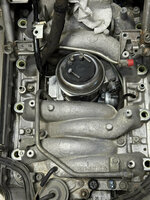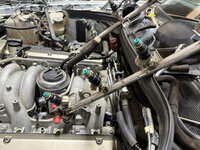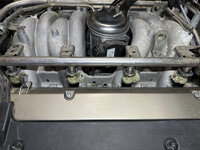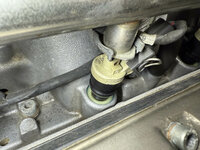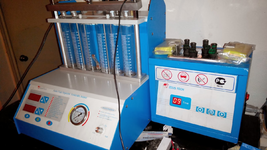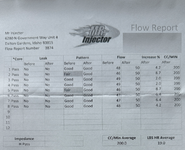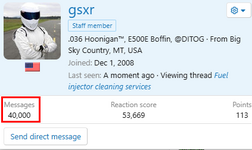I've always believed that the Bosch & Siemens electronic fuel injectors used on the M104, M119, and M120 engines rarely fail, don't need periodic servicing. I felt that using a top-quality (also, expensive) injector cleaner periodically (like Red Line SI-1) along with only using Top Tier gasoline was all that was needed to keep injectors clean. I'd use a bottle of the SI-1 every 25-50kmi or so, maybe. If only feeding your car Top Tier fuels, you shouldn't need to use this stuff. I'd typically use a bottle of SI-1 when I bought a car and had no idea what the PO was putting in the tank.
In late 2023, I discovered that yes, the injectors can fail - they can start leaking from the injector body! Full details are in this thread. That was depressing news. Jono confirmed that he recently encountered some leaking injectors too. More depressing was the discovery that injectors which leak in this manner cannot be repaired, they are junk.
I have long suspected that any company claiming to "rebuild" or "remanufacture" injectors was simply cleaning them, as there was nothing to repair. Turns out my suspicion was correct, as noted in the update I posted to the thread above describing the injector leak. The cost to buy so-called "rebuilt" is around $35-$40 each from FCP, RME, or AHAZ. All three vendors carry "GB Remanufacturing" brand (more info on GB in the "leak" thread). That's about $280-$320 per set, plus the cost to return your old injectors as cores.
Why not just buy remans for ~$300/set? Welp, for one, you'll never know how bad your old injectors were. And, buying remans is more expensive. There's also no guarantee all 8 remans will have equal flow, but in theory they should. Finally, you have no idea of the total miles on each injector from a mismatched set of 8 injectors, which likely each came from different engines. Why would you buy a set of remans? If you have leakers as described above, and do not have a matched-set of cores to get serviced, buying remans may be the most cost-effective option. The other choice is to buy a used set from a junkyard or other seller who claims they are from the same engine, so you know all 8 have similar use/wear, and get those serviced... and hope they are good. The latter option is a bit of a gamble. Unless the seller removed them from an engine they saw running properly and confirmed the injectors didn't leak, they likely have no clue.
Anyway. I was curious how bad a set of high-mile injectors might be. Our two cars that we bracket race all summer both have around 200kmi on the clock. I was nearly certain the one car had original injectors which had never been serviced. So, I pulled them out and sent them to Mr. Injector in northern Idaho for testing & cleaning (links below). Turns out they were really not that bad, but the cleaning service returned all 8 back to as-new performance. A photo of the flow report is attached below. I have a second set (from the other 200kmi car) currently being cleaned by Mr. Injector and I'll reply to this post with details on those when I get them back in a week or so. (Update - see post #13 below for results on the second set.)
Links below to some random injector cleaning services I found via Google, along with their pricing. I also browsed each site to see if they mentioned that injectors leaking from the body cannot be serviced / repaired. Some companies do state this, sometimes easily found in FAQ's, sometimes buried in fine print and difficult to locate. Sadly, several companies do NOT mention this at all which I find very annoying, as you'd waste time & money sending them leaking injectors which will fail testing, and they'll charge you to send them back. I chose Mr. Injector mostly because he is a local 1-man shop, and had excellent response time to emails sent, along with clear/informative communication. I was also hoping to reduce transit time since he was closer than any of the other shops. He's not the cheapest, but I have been impressed with his service. I may try one of the lower-cost options for grins next time.
Tips: Make sure the company performs both a static AND ALSO a dynamic test. Most shops include the dynamic test, but some change extra for this, like the place in NJ. Also check the return S&H costs, the place in NY has free returns, TX and ID are a flat $11 to return a set of 8, while RC in CA wants $30 which is silly. You can send a set of 8 injectors via USPS Small Flat Rate Box for about $10 with tracking. Listed in order from least expensive to most expensive:
Photos below of my 197kmi injectors before & after. I couldn't tell any significant difference in engine operation with the freshly serviced injectors. The engine took longer than normal to fire the first time when the new injectors were installed, because they were "dry", without any gasoline inside. Takes a few open/close cycles to push fuel through them. Oh, side note, when the injectors were removed I could see the intake valves clearly through the hole. The valves were shiny clean and looked brand new (photo below). No deposits visible at all, which is what I expected since the injectors spray directly onto the valves and Top Tier gas has cleaning additives.
Engines which have been fed low-quality fuel for long periods of time, or possibly engines that were in storage for many, many years where the fuel likely went stale and possibly gummed up the injector internals, might see significant improvements from a proper cleaning. Most frequently-driven vehicles (i.e., driven at least a few times per year) may not benefit much from the full removal & ultrasonic treatment. Only using Top Tier gas, plus occasional use of SI-1 in the tank, should be all you need.

In late 2023, I discovered that yes, the injectors can fail - they can start leaking from the injector body! Full details are in this thread. That was depressing news. Jono confirmed that he recently encountered some leaking injectors too. More depressing was the discovery that injectors which leak in this manner cannot be repaired, they are junk.

I have long suspected that any company claiming to "rebuild" or "remanufacture" injectors was simply cleaning them, as there was nothing to repair. Turns out my suspicion was correct, as noted in the update I posted to the thread above describing the injector leak. The cost to buy so-called "rebuilt" is around $35-$40 each from FCP, RME, or AHAZ. All three vendors carry "GB Remanufacturing" brand (more info on GB in the "leak" thread). That's about $280-$320 per set, plus the cost to return your old injectors as cores.
Why not just buy remans for ~$300/set? Welp, for one, you'll never know how bad your old injectors were. And, buying remans is more expensive. There's also no guarantee all 8 remans will have equal flow, but in theory they should. Finally, you have no idea of the total miles on each injector from a mismatched set of 8 injectors, which likely each came from different engines. Why would you buy a set of remans? If you have leakers as described above, and do not have a matched-set of cores to get serviced, buying remans may be the most cost-effective option. The other choice is to buy a used set from a junkyard or other seller who claims they are from the same engine, so you know all 8 have similar use/wear, and get those serviced... and hope they are good. The latter option is a bit of a gamble. Unless the seller removed them from an engine they saw running properly and confirmed the injectors didn't leak, they likely have no clue.
Anyway. I was curious how bad a set of high-mile injectors might be. Our two cars that we bracket race all summer both have around 200kmi on the clock. I was nearly certain the one car had original injectors which had never been serviced. So, I pulled them out and sent them to Mr. Injector in northern Idaho for testing & cleaning (links below). Turns out they were really not that bad, but the cleaning service returned all 8 back to as-new performance. A photo of the flow report is attached below. I have a second set (from the other 200kmi car) currently being cleaned by Mr. Injector and I'll reply to this post with details on those when I get them back in a week or so. (Update - see post #13 below for results on the second set.)
Links below to some random injector cleaning services I found via Google, along with their pricing. I also browsed each site to see if they mentioned that injectors leaking from the body cannot be serviced / repaired. Some companies do state this, sometimes easily found in FAQ's, sometimes buried in fine print and difficult to locate. Sadly, several companies do NOT mention this at all which I find very annoying, as you'd waste time & money sending them leaking injectors which will fail testing, and they'll charge you to send them back. I chose Mr. Injector mostly because he is a local 1-man shop, and had excellent response time to emails sent, along with clear/informative communication. I was also hoping to reduce transit time since he was closer than any of the other shops. He's not the cheapest, but I have been impressed with his service. I may try one of the lower-cost options for grins next time.
Tips: Make sure the company performs both a static AND ALSO a dynamic test. Most shops include the dynamic test, but some change extra for this, like the place in NJ. Also check the return S&H costs, the place in NY has free returns, TX and ID are a flat $11 to return a set of 8, while RC in CA wants $30 which is silly. You can send a set of 8 injectors via USPS Small Flat Rate Box for about $10 with tracking. Listed in order from least expensive to most expensive:
HPI Performance Injectors (Hobart, IN)
$12.50/each, dynamic testing. Could not find any FAQ about leaking body/case. Flat $7 return shipping! Estimated total cost $107 for 8 injectors. (Note - this may be limited-time/sale pricing.)
Injector Repair (Glenville NY)
$17/each, dynamic testing. Leak FAQ is hard to find. FREE return shipping. Estimated total cost $136 for 8 injectors. See post #25 below for sample report.
Injector RX (Houston, TX)
$20/each, dynamic testing. FAQ states "body leak not repairable". $11 return shipping. Estimated total cost $171 for 8 injectors.
Mr. Injector (Dalton Gardens, ID)
$22/each, dynamic testing. FAQ states "case leak not repairable". $11 return shipping. Estimated total cost $187 for 8 injectors.
Fuel Injector Clinic (Hobe Sound, FL)
$25/each. Unknown if dynamic testing. Could not find any FAQ about leaking body/case. $18-$26 return shipping. Estimated total cost $220 for 8 injectors.
Injector Rehab (Blackwood, NJ)
$27/each for dynamic testing. Could not find any FAQ about leaking body/case. $14-$20 return shipping. Estimated total cost $230 for 8 injectors. Several optional services available including "expedited" service, and a video of your injectors before/after for +$25.
RC Fuel Injection (Torrance, CA)
$35/each, dynamic testing. Could not find any FAQ about leaking body/case. Flat $30 return shipping! Estimated total cost $310 for 8 injectors.
Photos below of my 197kmi injectors before & after. I couldn't tell any significant difference in engine operation with the freshly serviced injectors. The engine took longer than normal to fire the first time when the new injectors were installed, because they were "dry", without any gasoline inside. Takes a few open/close cycles to push fuel through them. Oh, side note, when the injectors were removed I could see the intake valves clearly through the hole. The valves were shiny clean and looked brand new (photo below). No deposits visible at all, which is what I expected since the injectors spray directly onto the valves and Top Tier gas has cleaning additives.
Engines which have been fed low-quality fuel for long periods of time, or possibly engines that were in storage for many, many years where the fuel likely went stale and possibly gummed up the injector internals, might see significant improvements from a proper cleaning. Most frequently-driven vehicles (i.e., driven at least a few times per year) may not benefit much from the full removal & ultrasonic treatment. Only using Top Tier gas, plus occasional use of SI-1 in the tank, should be all you need.

Attachments
-
 flow_report1.jpg403.2 KB · Views: 18
flow_report1.jpg403.2 KB · Views: 18 -
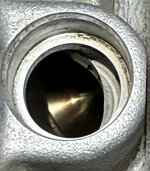 intake_valve2.jpg175.4 KB · Views: 12
intake_valve2.jpg175.4 KB · Views: 12 -
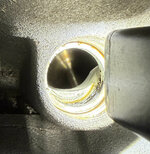 intake_valve1.jpg382.7 KB · Views: 11
intake_valve1.jpg382.7 KB · Views: 11 -
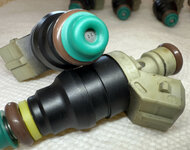 injectors_serviced4.jpg165.7 KB · Views: 10
injectors_serviced4.jpg165.7 KB · Views: 10 -
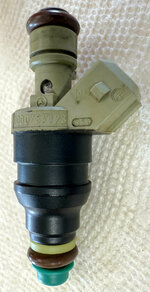 injectors_serviced3.jpg229.3 KB · Views: 11
injectors_serviced3.jpg229.3 KB · Views: 11 -
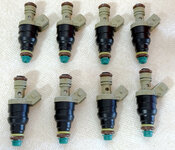 injectors_serviced2.jpg273.9 KB · Views: 10
injectors_serviced2.jpg273.9 KB · Views: 10 -
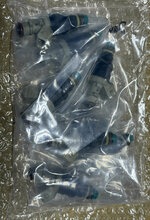 injectors_serviced1.jpg382.3 KB · Views: 10
injectors_serviced1.jpg382.3 KB · Views: 10 -
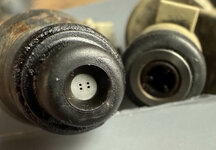 injectors_before2.jpg142.5 KB · Views: 9
injectors_before2.jpg142.5 KB · Views: 9 -
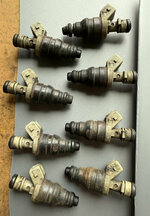 injectors_before1.jpg422.8 KB · Views: 14
injectors_before1.jpg422.8 KB · Views: 14 -
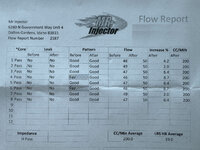 flow_report2 copy.jpg243.6 KB · Views: 16
flow_report2 copy.jpg243.6 KB · Views: 16
Last edited:




